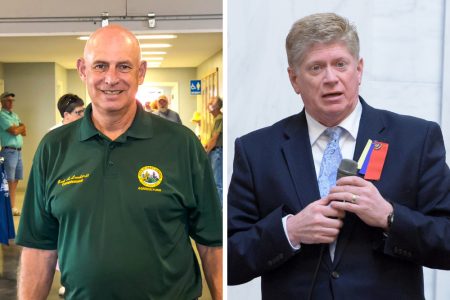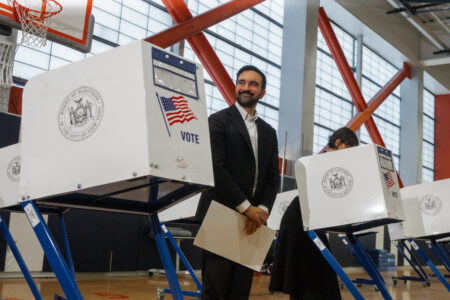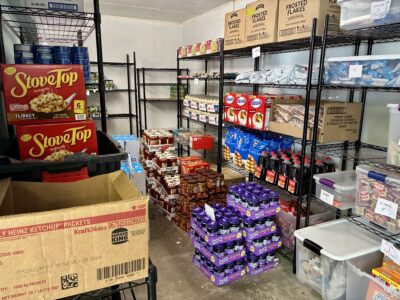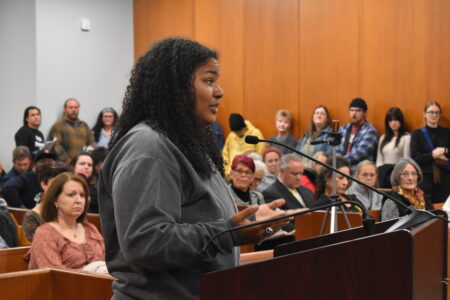Candidates for Ag Commissioner Make Their Case to W.Va. Voters

Photo Provided – West Virginia Agriculture Commissioner Kent Leonhardt, left, is running for a second term against Bob Beach, a Democratic state senator with an agriculture background of his own.
CHARLESTON — While West Virginia is associated with the coal miner, the great seal of the state features a farmer holding an axe, a plow at his side, and his harvest at his feet.
In the Nov. 3 general election, voters will decide whether to keep the current commissioner of the Department of Agriculture or make a switch.
Former Republican lawmaker Kent Leonhardt is running for a second term as the state’s top representative for farming and agriculture.
He is being challenged by Bob Beach, a Democratic state senator with an agriculture background of his own.
Both represented part of Monongalia County when Leonhart served in the state Senate. Now they will face off to run one of the largest departments on the Board of Public Works.
HARVEST TIME
Leonhardt hopes that the voters who swept him into office in 2016 will take a look at what he has done during his first term at the Department of Agriculture.
“I’m running again because I think I’ve earned the trust of the voters and the work that we’ve done in the past three-and-a-half, almost four years now, because we have actually seen agriculture grow in West Virginia,” Leonhardt said. “I want to take what we’ve done, and I want to build on that and show where we really can take agriculture in the State of West Virginia.”
A retired Marine Corps lieutenant colonel, Leonhardt settled down on a farm in Monongalia County. After running – and losing – as a Republican candidate for agriculture commissioner in 2012 to former state Senator Walt Helmick, Leonhardt ran for state Senate. He spent a half of one term representing the 2nd District, spanning from Marshall and Monongalia counties in the north, to Calhoun and Gilmer counties in the south.
In 2016, he challenged Helmick again and won, winning by more than 47,000 votes and by 7.1 percentage points. Since taking office in 2017, Leonhardt points to successes in growing new kinds of agriculture and crops, such as lavender farming and processing in Boone County, growth in farm stores and farmers’ markets, and increasing the number of hemp farms in the state.
“We started with 28 hemp farms when I took office to over 330 hemp farms and processing facilities in the State of West Virginia,” Leonhardt said. “Despite the naysayers out there about hemp, we must be doing something right to get that kind of growth.”
Leonhardt also points to work the Department of Agriculture has done with the West Virginia Legislature to loosen regulations so that the cottage food industry can grow. This has also helped spur growth in locally grown and processed food products.
“Farmers’ markets have doubled in the last year of my administration,” Leonhardt said. “That’s because we’ve changed the law and regulations to for the cottage food industry and made it less restrictive. We set up the environment where people can try a new product and develop that product. It’s a lot easier than in the past.”
The COVID-19 pandemic has affected farming and agriculture across the country in how food makes it to the dinner table, as well as the lack of access to food for people below the poverty line. The Department of Agriculture has worked with state agencies and the federal government on grant funding for the state’s two major food banks to keep local pantries stocked.
“We brought more food in for our citizens that were going hungry,” Leonhardt said. “We reworked our distribution systems to make sure no West Virginian went hungry. We worked closely with the National Guard and the Governor’s Office and the Department of Education to make sure the food was getting to where it’s needed.”
Leonhardt also said the state was able to work with farmers and producers to find markets for their products to prevent farmers from having to waste those products as consumer spending slowed down during the month-long shutdown last spring.
“I’ve got to give a shout out to the Department of Agriculture during this pandemic,” Leonhardt said. “This was a crisis, but we actually kept agriculture open. There was no milk dumped as you saw in other states. There was no poultry or hogs euthanized as we saw in other states. In fact, we were able to bring more milk and were able to bring more hogs in for processing into the State of West Virginia during this pandemic.”
Going into a second term, Leonhardt wants to continue to focus on growing the food processing and manufacturing industry in the state. In the wake of the COVID-19 pandemic that revealed weaknesses in the supply chains, Leonhardt sees an opportunity to create new jobs and also bring the supply chain closer to the state.
“What we have to do is we have to continue to create the business environment in the State of West Virginia so that we attract agricultural businesses into the state,” Leonhardt said. “We’re talking about food processing. We’ve lost a lot of manufacturing jobs over the years. Food processing is really a manufacturing job, so we can have those good type paying jobs.”
Leonhardt also wants to continue to market West Virginia food products locally and nationally through the West Virginia Grown campaign. West Virginia food-based businesses can apply to the program if their product is produced, grown or manufactured complete in West Virginia. Leonhardt said West Virginia Grown will help keep dollars in the state economy and encourage health eating.
“As we develop our West Virginia Grown program, people are starting to want to know where their food is coming from,” Leonhardt said. “Those dollars stay in West Virginia, and also that food is healthier for our citizens. I see going forward as we do more work on local foods, we’re going to see an improvement in local health, and we see the savings and tax dollars that are going to solve some of the medical problems.”
WHERE’S THE BEEF?
Beach, the Democratic challenger, might live in the second largest city in the state, but his roots go back to the farm. The son of the late Monongalia County delegate Robert Beach, Bob Beach grew up on an 800-acre cattle farm.
Beach’s agriculture business is multifaceted, working as a meat cutter, a commodity buyer, and a manager of a chain of grocery stores. That experienced served him well when he was appointed to fill the remaining term of his father in the House of Delegates in 1998. He won election to the House of Delegates and served from 2001 to 2011, serving as chairman of the House Agriculture and Natural Resources Committee.
Beach replaced Michael Oliverio in the state Senate in 2011 and is now in the middle of his third term representing the 13 District, which includes Marion County and parts of Monongalia County. For a time, he chaired the Senate Transportation and infrastructure Committee until Republicans took the majority in the Senate in 2014, but he has always served as a member of the Agriculture and Rural Development Committee.
Nearly two years ago, Beach said he was approached by a group of farmers with issues with how the Department of Agriculture was being managed. It was at their urging that Beach decided it was time to put his 54 years of agriculture experience to work as the next commissioner.
“When they asked me to jump in and challenge the current commissioner for commissioner of agriculture, they didn’t have to twist my arm too much because it’s something I’ve always wanted to do,” Beach said. “It touches everyone’s lives. Everyone eats, everyone consumes food, whether it be vegetables or meat. Everyone consumes food.”
Beach said the Department of Agriculture should have been focusing on food manufacturing a long time ago. Beach sees opportunities for large-scale manufacturing – such as creameries – that not only produce a product but also spin off downstream businesses that can use those products to manufacture other products.
“It’s a chain reaction that one little business could start that develops into quite a large business,” Beach said. “There’s economic opportunities there for us here in the State of West Virginia.”
Part of the problem at the Department of Agriculture, Beach said, is a top-down approach which issues directives and edicts instead of asking farmers and food producers what they need and how the state can help.
“I want to go back to communication,” Beach said. “I’m an old grocer and communication with your customers is critical. If you come into my office, I’m not going to tell you what you need. I’m going to ask you how can we help you, and I expect everybody on staff to do the same thing.”
Beach also said the Department of Agriculture does a great job of promoting itself, but not as great of a job promoting farmers and food producers. Beach said he would re-focus marketing at the department.
“We’re going to address advocacy in the Department of Agriculture,” Beach said. “Many people out there say they advocate for themselves. There are nice little marketing pieces out there focused on Department of Agriculture, but not on the farmers who are actually boots on the ground. We want to grow that agricultural industry. We want to market it in a way and brand it in a way for people outside of the State of West Virginia, just like we do with tourism.”
Among many of Beach’s issues, hemp is one area where he says the state as a whole dropped the ball. Beach said there needs to be more testing available for hemp to ensure the product in in compliance with state and federal laws. More testing, either in the form of additional staff or allowing farmers to outsource testing, would help ensure the type of cannabis plant stays within the legal range of THC, the cannabinoid that gives hemp and marijuana their psychotropic properties. If the THC reaches a certain level in hemp, the crop must be destroyed.
“Hemp is one of those plants that the more mature it gets, the hotter that THC gets, the higher it gets, so you have to catch it at a right time,” Beach said. “If you give these guys the authority to contract with someone – say from Washington, D.C. or Virginia for the Eastern Panhandle – they can be there within an hour and a half and they could take those samples. We may go along the route.”
At the same time, Beach said the state needs to reduce fees on hemp growers that are nickeling and diming the industry. Beach said testers from the Department of Agriculture often charge the same hemp farmer with multiple fields fees for each field instead of just one fee.
“If he comes over to the Eastern Panhandle and your plots are within a mile of each other, he’s charging you five separate visits from Charleston, even though he took all the samples in one day,” Beach said. “That’s our responsibility at the Department of Agriculture, plain and simple. You’re going to pay a flat fee.”
For Beach, the race for the agriculture commissioner seat is a chance to talk about a subject that has played a role through his entire life. For Beach, agriculture is not a retirement hobby.
“I like to meet with people, and I like to chat about agriculture,” Beach said. “I’m not afraid to stand in front of a group of people and talk about agriculture, because I know agriculture. I don’t believe Mr. Leonhardt knows agriculture.”






